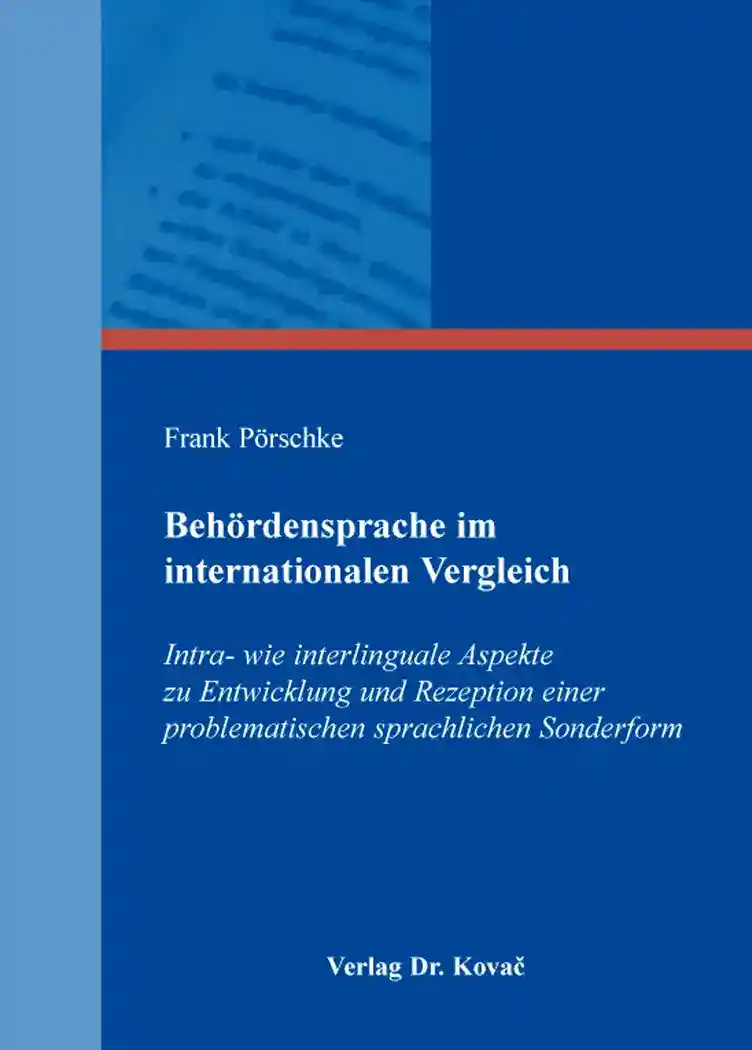Frank PörschkeBehördensprache im internationalen Vergleich
Intra- wie interlinguale Aspekte zu Entwicklung und Rezeption einer problematischen sprachlichen Sonderform
Studien zur Germanistik, volume 54
Hamburg 2015, 308 pages
ISBN 978-3-8300-8240-8 (print) |ISBN 978-3-339-08240-4 (eBook)
Rezension
[...] Kritisiert wird die Behördensprache in Deutschland genau so wie in Österreich und im Vereinigten Königreich. Erwähnt sei speziell der Aspekt der Sprachpflege, der im englischsprachigen Raum viel weniger ausgeprägt ist. Den Grund ortet der Autor im Umstand, dass im Englischen selten eine von fremdsprachlichen Einflüssen bereinigte Sprache, sondern vielmehr eine einfache Sprache gefordert wird. [...]
[...] Das Buch ist gut geschrieben und liest sich entsprechend leicht, was zeigt: Nicht nur Behördensprache, sondern auch Wissenschaft kann durchaus verständlich sein.
About this book deutschenglish
Almost everybody knows the situation: a letter from a public institution arrives and reading it causes negative reactions, brought up not so much by the content but by the choice of language: long, twisted and unintelligible sentences, cryptic technical terms and incomprehensible abbreviations. Is this "typical German officialese"? Or rather – as can be deducted from numerous studies conducted in Germany as well as abroad – an international phenomenon crossing linguistic barriers? For the first time, the work on hand draws a comparison between official parlance in selected communities from three different countries – Germany, England and Austria. Starting from an outline of how the special linguistic form for the administration in the specific countries has developed historically, its grammatical and syntactical characteristics are summarized. Furthermore, the historical extent of public criticism is outlined and attempts at improvements are discussed. Populistic polemicizing against authorities as such is, however, not the point here: Insights and findings from interviews with leading members of administrative staff ensure that the opinions of authorities themselves are considered, as well. Linguistic analysis of documents addressed directly to citizens allows for a detailed portrayal of similarities and differences in written communication between administration and citizens in the countries compared. It is also elucidated which linguistic particularities can be regarded as interlingual characteristics for the administrative use of language. Thus, the study serves as another step towards internationally oriented solution approaches for a more citizen-friendly official parlance.Keywords
BehördenschreibenBehördenspracheBescheideBürger-Behörden-KommunikationBürgerfreundlichkeitDeutschlandEnglandFachsprachenforschungÖsterreichTextlinguistikVerwaltungsspracheIhr Werk im Verlag Dr. Kovač

Möchten Sie Ihre wissenschaftliche Arbeit publizieren? Erfahren Sie mehr über unsere günstigen Konditionen und unseren Service für Autorinnen und Autoren.
